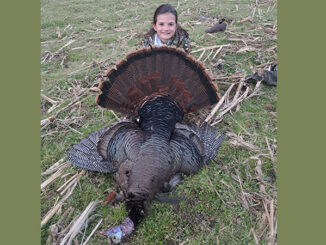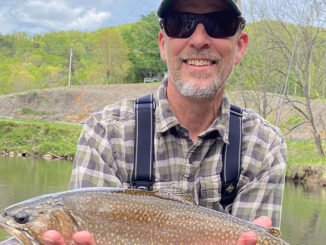
Jackson County has turned fish into tourism
Jackson County is a rising star in the world of trout fishing. It has the longest and most popular delayed-harvest waters in the state. It has the first and only official Fly Fishing Trail, featuring 15 of the area’s finest trout streams, and it will soon have the distinction of joining the state’s Mountain Heritage Trout Waters program.
Because of Jackson County’s status as a prime trout-fishing destination, the Southeastern Council of the Federation of Fly Fishers selected it for its annual fly fishing festival, one of the largest such festivals, if not the largest, in the Southeast.
The delayed-harvest section of the Tuckasegee, which runs from below Western Carolina University to Dillsboro, attracts fly fishers from throughout the Southeast. Most of the out-of-state fly fishers come from Georgia, South Carolina, Tennessee and Florida, but it’s not unusual to see license plates from numerous other states parked along the sides of the river. The N.C. Wildlife Resources Commission stocks the 5.5-mile delayed-harvest section annually with 49,000 brook, rainbow and brown trout in March, April and May, and again in October and November. The delayed-harvest waters are especially popular with area and regional fishing guides. It’s not unusual to see a dozen or more drift-boats on the river during the peak fishing season.
While the Tuckasegee gets most of the attention and action, Jackson County has scores of other trout streams, wild and stocked. Panthertown and Greenland creeks, headwaters of the Tuckasegee River in southeastern Jackson County, are populated with brook trout, some in the trophy range. The two streams, along with Flat Creek, a tributary of Bear Creek Lake, are catch-and-release, artificial lures-only streams. Six streams in the county are designated as wild-trout waters, six others are designated as wild-trout, natural-bait waters, and six streams and five lakes are designated as hatchery-supported waters. Plus, the county has numerous streams that are populated with trout but are in the undesignated trout waters category.
The Western North Carolina Fly Fishing Trail, established in 2009, features 15 of the area’s best trout streams, small and large. Created by Alex Bell, a former educator and now a full-time fishing guide, and Bobby Kilby, a native of the area who now lives on Pawley’s Island, S.C., the trail includes stocked streams, wild-trout streams, and the delayed-harvest section of the Tuckasegee River. The trail map recently was updated to include Raven Fork, catch-and-release trophy waters on the Cherokee Indian Reservation. The trail map can be accessed online at www.FlyFishingTrail.com.
Julie Spiro, executive director of Jackson County Tourism, said the trail has been a big boost for the county’s tourism. Her department has distributed approximately 50,000 trail maps, which are free for the asking.
“From September to early spring,” she said, “between 20 and 30 percent of our inquiries are about fishing,” most of them asking about the fly fishing trail.
Spiro and Craig Distl, who handles public relations for Jackson County Tourism, said the trail definitely has had a positive impact on the county’s economy.
Fly-fishing outfitters such as Brookings in Cashier have experienced increased business since the trail was established. Hookers, a fly shop and guide service in downtown Sylva, was established in direct response to the popularity of the fishing trail.
The Mountain Heritage Trout Waters program, a cooperative effort of the Commission and local governments, was established to encourage trout fishing as a heritage tourism activity. Sylva, Webster and Dillsboro will be designated as Mountain Heritage Trout Water Cities. Residents and visitors may purchase a special 3-day license for $5 and fish in selected waters, which will include sections of Scott Creek, which flows through Sylva and Dillsboro, and sections of the Tuckasegee River. Participants can get free loaner fishing gear from participating businesses. Spiro said the program is expected to be formalized in early summer. Only five other cities and towns in Western North Carolina have the Heritage Trout Waters designation.
Distl said the decision to move the festival from Georgia to Cullowhee was influenced in part by the county’s fishing trail and the fact that May is a prime time for trout fishing in the mountains. The festival usually is held in much larger venues. It will be held in the Ramsey Center at Western Carolina University the weekend of May 17-18. The festival includes programs by expert fly fishers and fly-tiers, fly-fishing industry exhibits and educational programs. Information about the festival is available online at http://southeastfff.org/festival-2013/.







Be the first to comment